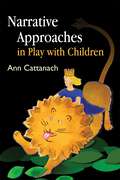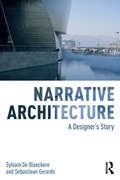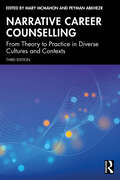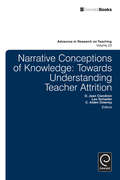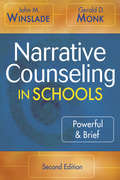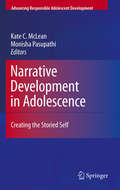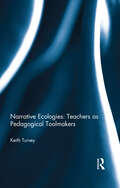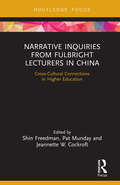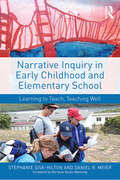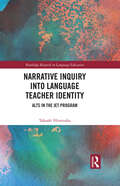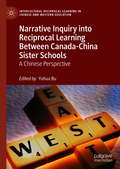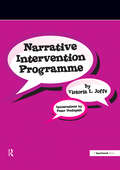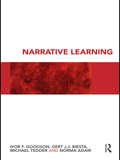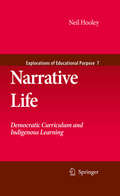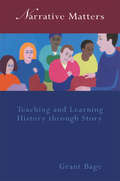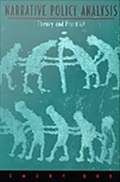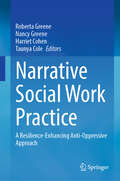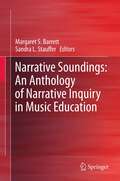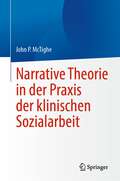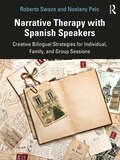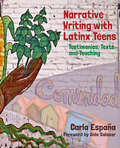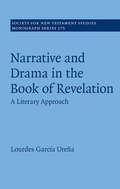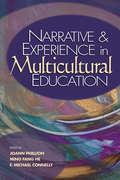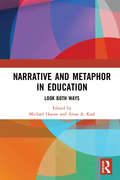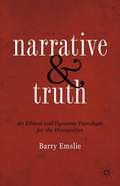- Table View
- List View
Narrative Approaches in Play with Children
by Ann Cattanach Alison WebsterNarrative play is a way of communicating with children using imaginative stories and narratives to share and make sense of life events. This book describes using narrative play therapeutically with children who have lived in multiple families, children who have problems with social understanding and children who have learning difficulties. Ann Cattanach explains how children's stories and narratives, whether they are about real or imagined events, can be interpreted as indicators of their experiences, their ideas, and a dimension of who they are. She demonstrates this with examples of children's stories from her clinical experience, and provides narrative play techniques and sample scripts both for therapists and for parents whose circumstances require a therapeutic parenting approach. This book is essential reading for play therapists, social workers and other professionals working with children, as well as parents and carers of children who are experiencing social and/or learning difficulties.
Narrative Architecture: A Designer's Story
by Sebastiaan Gerards Sylvain De BleeckereNarrative Architecture explores the postmodern concept of narrative architecture from four perspectives: thinking, imagining, educating, and designing, to give you an original view on our postmodern era and architectural culture. Authors Sylvain De Bleeckere and Sebastiaan Gerards outline the ideas of thinkers, such as Edmund Husserl, Paul Ricoeur, Emmanuel Levinas, and Peter Sloterdijk, and explore important work of famous architects, such as Daniel Libeskind and Frank Gehry, as well as rather underestimated architects like Günter Behnisch and Sep Ruf. With more than 100 black and white images this book will help you to adopt the design method in your own work.
Narrative Career Counselling: From Theory to Practice in Diverse Cultures and Contexts
by Mary McMahon Peyman AbkhezrBoth accessible and comprehensive, Narrative Career Counselling bridges the gap between theory and practice to allow a full understanding of the topic and allow confident implementation within professional settings.This new edition offers updated chapters showcasing an increased focus on diverse contexts and cultures. It brings together 33 high-profile international experts from 10 countries to share perspectives on theory and provide practical ideas about how to implement narrative career counselling. Fully updated to reflect changes in the field, including the growth of narrative counselling, it: provides a foundation for narrative career counselling by considering its philosophical and theoretical background; presents a range of approaches that demonstrate the integration of theory and practice; studies the application of narrative career counselling in a range of cultures and contexts; and provides examples of practical application. This resource is essential reading for anyone who wants to learn more about narrative career counselling including beginners to the field, experienced researchers, career counsellor educators, career counsellors, and practitioners and students studying in this field.
Narrative Conceptions of Knowledge: Towards Understanding Teacher Attrition (Advances in Research on Teaching, Vol. #23)
by D. Jean Clandinin C. Aiden Downey Lee Schaefer Eliza PinnegarThe book volume shares six narrative accounts, which offer glimpses into the teachers' lives, which are composed with attention to place, temporality, and personal and social dimensions.
Narrative Counseling in Schools: Powerful & Brief
by Gerald D. Monk John M. WinsladeHelp students shed negative labels and develop healthy behaviors! This updated edition will assist students in narrating stories that "redescribe" who they are and who they can be.
Narrative Development in Adolescence
by Kate C. Mclean Monisha PasupathiThe need to establish a narrative self reaches an important peak during adolescence as teens work to understand life events and establish their self-identity. The first book to examine narrative development during adolescence in depth, Narrative Development in Adolescence: Creating the Storied Self, focuses on both stable and at-risk youth as they construct, organize, and tell their life stories and link these stories to larger developmental contexts as they grow to maturity. Renowned specialists identify such core skills as reflection, meaning making, and decision making as well as crucial domains, including autonomy and moral agency evolving across normative adolescence, and relate them to the narrative process. Deficits in these key areas are seen in the more contradictory and incoherent stories narrated by delinquent youth, teenage mothers, and victims of war and violence. In addition, these themes are observed as adolescents process and interpret the narratives of others. This volume offers insights into the crucial task of identity development, and explores new possibilities for counseling and therapy. Its authoritative and accessible coverage: Examines the relationships between narrative and developmental outcomesIdentifies normative and problematic issues in adolescents across cultures and social backgrounds in the United States, Canada, Germany, the former Yugoslavia, and New ZealandOffers current research on adolescent narrative development, with attention to theoretical bases and methodological issuesDiscusses the roles of parents, grandparents, and peers in shaping narrativesFeatures case studies of narratives from at-risk youthIncludes findings on how early narrative development predicts narrative identifying adolescenceNarrative Development in Adolescence is an essential resource for researchers, clinicians, and graduate students in developmental, clinical child, and school psychology as well as allied mental health and education fields. It is a must-have volume for anyone conducting research or working with adolescents to ensure their healthy development and successful transition to adulthood.
Narrative Ecologies: Teachers As Pedagogical Toolmakers
by Keith TurveyIn recent years there has been significant investment by policy makers in the potential of technological tools to transform learning and teaching across a range of professional practitioner groups; education, nursing and social care. There remain, however, outstanding issues concerning the ways educators and professional practitioners harness the p
Narrative Inquiries from Fulbright Lecturers in China: Cross-Cultural Connections in Higher Education
by Shin Freedman Pat Munday Jeannette W. CockroftThis collection of nine Fulbright educators’ narrative accounts examines how these scholars navigated their teaching responsibilities with students, time with fellow colleagues, and cultural expectations in China, ranging from experience in teaching arts and government to questions of religion, emotional literacy, and urban infrastructure. With these contributions, authors analyze their own expectations against their actual experiences in order to offer insights for scholars and students of study abroad programming. As a roadmap for negotiating China’s higher education network and for taking advantage of any cross-cultural educational environment, this book highlights the type of fruitful educational programming that can come from cultural, historical, economic, and political difference.
Narrative Inquiry in Early Childhood and Elementary School: Learning to Teach, Teaching Well
by Daniel R. Meier Stephanie Sisk-HiltonAs top-down educational reform policies at local and national levels increasingly isolate teachers from their own professional and instructional agency, and stultify children’s passion for learning, new techniques are needed for understanding and transforming educational practices. Narrative Inquiry in Early Childhood and Elementary School: Learning to Teach, Teaching Well facilitates meaningful change in early years education by providing early childhood and elementary school teachers with methods to incorporate narrative into their instruction and inquiry. This book offers practical strategies for incorporating narrative tools and structures into the classroom, and encouraging effective conceptual, pedagogical, and personal avenues for engaged teaching and learning across languages and cultures. The book’s chapters promote a lively discussion of central tenets of narrative inquiry and illustrative examples of teachers at work with narrative and inquiry for improving their practice and children’s learning.
Narrative Inquiry into Language Teacher Identity: ALTs in the JET Program (Routledge Research in Language Education)
by Takaaki HiratsukaThis book provides insights for both native language teachers and local language teachers alike who conduct team-taught lessons by revisiting the topic of foreign assistant language teachers (ALTs), the Japan Exchange and Teaching (JET) program, and team teaching. This book is innovative in that (a) it is the first to elucidate ALTs’ experiences comprehensively, across both historical time (i.e., prior to, during, and after the JET program) and social space (i.e., inside and outside the school), thereby revealing their multiple identities that they come to construct and reconstruct over time, and (b) it explores the meanings and perspectives of particular phenomena that ALTs experience within their specific social settings from their own individual points of view. This inquiry does this by using personal narrative accounts gathered from multiple participants. Through these narrative accounts, Hiratsuka formulates a conceptualization of ALT identity, an effort that has hitherto been neglected. As a consequence, this book offers several practical and empirical applications of the conceptualization to future endeavors involving native language teachers and those who engage with them, including the key stakeholders of local language teachers, their local boards of education, the governments, and language learners across the globe.
Narrative Inquiry into Reciprocal Learning Between Canada-China Sister Schools: A Chinese Perspective (Intercultural Reciprocal Learning in Chinese and Western Education)
by Yuhua BuThis edited volume explores how Chinese school-based educators learn from others and attain awareness in dialogue with the world in an era of increasing globalization and information exchange. Minzhu Primary School in Shanghai, China, and Bay Street School in Toronto, Canada, have been connected as sister schools of cross-cultural exchange since 2008. Together, they have explored ways to reciprocally learn in a cross-cultural partnership while remaining grounded in their home culture and language. In this book, chapter authors examine how Chinese school-based educators view themselves, understand others, and grow and develop as a consequence of a decade of cross-cultural reciprocal learning as sister schools. Further, the authors discuss prospects for future educational interactions between Canada and China.
Narrative Intervention Programme
by Victoria JoffeThis book improves the understanding and telling of stories in secondary school students and young adults. Specifically designed for older children and young adults, this practical language programme was created by a specialist speech & language therapist with input from secondary school teachers and students. It focuses on enhancing the understanding and expression of stories in students aged from 8 to 18 with language and communication difficulties, and aims to: create an awareness of how storytelling can be used to enhance learning in school and social interactions in school and home environments. It facilitates storytelling. It enhances the joy and enjoyment in telling stories. It identifies different types of narratives and provide examples for each type. It encourages effective listening and attention skills. It examines different means of making story production more interesting through vocal variety, body language and print. It encourages the use of the story planner in planning and structuring essays in the classroom and for homework. Dr Victoria Joffe is a specialist speech and language therapist and senior lecturer in developmental speech, language and communication impairments in the Department of Language and Communication Science at City University, London. Victoria runs various workshops for PCT's, LEA's and schools on child speech disorder, evidence based practice in speech and language therapy and collaborative practice in education and provides training for therapists and teaching staff on working with children and young adults with speech, language and communication needs in education. Victoria is currently involved in a large scale intervention project funded by the Nuffield Foundation on enhancing language and communication in secondary school children with language impairments on which this programme is based.
Narrative Learning: Life History And Learning (Counterpoints Ser. #386)
by Gert Biesta Ivor F. Goodson Michael Tedder Norma AdairWhat is the role of narrative in how people learn throughout their lives? Are there different patterns and forms of narrativity? How do they influence learning? Based on data gathered for the Learning Lives project, which sought to understand learning by questioning individuals about their life stories, this book seeks to define a new learning theory which focuses on the role of narrative and narration in learning. Through a number of detailed case-studies based on longitudinal interviews conducted over three and four-year periods with a wide range of life story informants, Narrative Learning highlights the role of narrative and narration in an individual’s learning and understanding of how they act in the world. The authors explore a domain of learning and human subjectivity which is vital but currently unexplored in learning and teaching and seek to re-position learning within the ongoing preoccupation with identity and agency. The ‘interior conversations’ whereby a person defines their personal thoughts and courses of action and creates their own stories and life missions, is situated at the heart of a person’s map of learning and understanding of their place in the world. The insights presented seek to show that most people spend a significant amount of time rehearsing and recounting their life-story, which becomes a strong influence on their actions and agency, and an important site of learning in itself. Narrative Learning seeks to shift the focus of learning from the prescriptivism of a strongly defined curriculum to accommodate personal narrative styles and thereby encourage engagement and motivation in the learning process. Hence the book has radical and far-reaching implications for existing Governmental policies on school curriculum. The book will be of particular interest to professionals, educational researchers, policy-makers, undergraduate and postgraduate learners and all of those involved with education theory, CPD, adult education and lifelong learning.
Narrative Life: Democratic Curriculum and Indigenous Learning
by Neil HooleyWritten with educational practitioners in mind and set in a framework of progressive epistemology and pedagogy, this work tackles issues of global concern. It seeks to answer the question of how we structure education for the world's 370 million indigenous people so as to promote intercultural understanding, maximize opportunity and right colonial wrongs. Hooley's work details an innovative curriculum design for indigenous school children based on the principles of participatory narrative inquiry, as well as exemplars of indigenous knowledge. Written from an Australian perspective, the book discusses broad international issues that impact on schooling such as globalisation, democratic education and whiteness and raises significant questions regarding indigenous culture and knowledge. Taking inspiration from the works of John Dewey and Paulo Freire, Hooley asserts that a curriculum based on participatory narrative inquiry recognises and respects the interests and rights of local Indigenous communities. Further, it provides a mechanism for linking with white mainstream curricula through the compilation of portfolios of student work and exemplars of knowledge across all subjects areas. This model views formal schooling as a central aspect of a child's personal, family and community narrative and does not impose knowledge from without, but constructs knowledge from within. Learning is given an indigenous context and thus two-way inquiry between cultural viewpoints is encouraged. Narrative Life makes an original contribution to Indigenous education worldwide, and does so across all settings of primary and secondary schooling.
Narrative Matters: Teaching History through Story
by Dr Grant Bage Grant BageIn recent years there has been a massive revival of interest internationally in what story can offer to education. This book covers a range of issues at the heart of teaching history, such as the use of talk, the pitfalls of narrative as a pedagogical tool, translating curriculum content into lessons, story telling and story making. It also questions what it means to teach, the difficulties for teachers of remaining constructively critical of policy, and their own practice, during periods of national legislation and change.
Narrative Policy Analysis
by Practice TheoryNarrative Policy Analysis presents a powerful and original application of contemporary literary theory and policy analysis to many of today's most urgent public policy issues. Emery Roe demonstrates across a wide array of case studies that structuralist and poststructuralist theories of narrative are exceptionally useful in evaluating difficult policy problems, understanding their implications, and in making effective policy recommendations. Assuming no prior knowledge of literary theory, Roe introduces the theoretical concepts and terminology from literary analysis through an examination of the budget crises of national governments. With a focus on several particularly intractable issues in the areas of the environment, science, and technology, he then develops the methodology of narrative policy analysis by showing how conflicting policy "stories" often tell a more policy-relevant meta-narrative. He shows the advantage of this approach to reading and analyzing stories by examining the ways in which the views of participants unfold and are told in representative case studies involving the California Medfly crisis, toxic irrigation in the San Joaquin Valley, global warming, animal rights, the controversy over the burial remains of Native Americans, and Third World development strategies. Presenting a bold innovation in the interdisciplinary methodology of the policy sciences, Narrative Policy Analysis brings the social sciences and humanities together to better address real-world problems of public policy--particularly those issues characterized by extreme uncertainty, complexity, and polarization--which, if not more effectively managed now, will plague us well into the next century.
Narrative Social Work Practice: A Resilience-Enhancing Anti-Oppressive Approach
by Nancy Greene Roberta Greene Harriet Cohen Taunya ColeThis book highlights the co-creation of the narrative interview and explains how the narrative method can be used to promote competence and wellness, resist oppression, and ultimately liberate clients from their problems. The person-in-environment concept brings together a wide range of personal and societal micro to macro influences that allow practitioners to engage in an effective helping process with diverse individuals, families, groups, organizations, and communities. The textbook has been written at a time of pronounced sociocultural and historical flux, uncertainty, and civil strife that threaten to disrupt the social fabric of the United States. Consequently, the book augments the resilience-enhancing stress model (RESM) approach to the narrative methodology. Each chapter of the text describes a client or constituency undergoing a life transition and the associated risks (stressors) and protective factors surrounding them. Among the topics covered are: Adopting RESM Anti-Oppressive Social Work Strategies: A Micro to Macro Approach Co-creating a Narrative: Forming Personal Identity Macrolevel Narrative Skills and Techniques Proactive Resilience Social Work Practice Time, Place, and Resilience The ultimate purpose of the book is for social workers to develop the ability to enhance clients' and constituencies' optimal resilient social functioning in a just and equitable world that embraces diversity, equity, and inclusion. Although narrative social work practice is not yet widely applied, the text elucidates how storytelling can break new ground in achieving asset-based, resilience-enhancing social work practice as well as redress social, economic, and political injustice. Narrative Social Work Practice: A Resilience-Enhancing Anti-Oppressive Approach is the third in a series of texts that defines risk and resilience theory and its offshoot—the RESM. The book is intended primarily for generalists and advanced students as well as practitioners in the social work field.
Narrative Soundings: An Anthology of Narrative Inquiry in Music Education
by Sandra L. Stauffer Margaret S. BarrettThis volume focuses specifically on narrative inquiry as a means to interrogate research questions in music education, offering music education researchers indispensible information on the use of qualitative research methods, particularly narrative, as appropriate and acceptable means of conducting and reporting research. This anthology of narrative research work in the fields of music and education builds on and supports the work presented in the editors' first volume in Narrative Inquiry in Music Education: Troubling Certainty (Barrett & Stauffer, 2009, Springer). The first volume provides a context for undertaking narrative inquiry in music education, as well as exemplars of narrative inquiry in music education and commentary from key international voices in the fields of narrative inquiry and music education respectively.
Narrative Theorie in der Praxis der klinischen Sozialarbeit
by John P. McTigheDieser Theorie-Praxis-Leitfaden bietet Psychiatrie-Erfahrenen einen leistungsstarken erzählbasierten Ansatz für die Arbeit mit Klienten in der klinischen Praxis. Es beginnt mit einer Einführung in die zeitgenössische Erzähltheorie und bietet einen soliden Rahmen, der auf der Kunst und den Techniken des Zuhörens basiert, um ein tieferes und sinnvolleres Verständnis und Eingreifen zu ermöglichen.Die Kapitel vertiefen diese grundlegenden Konzepte, indem sie sie auf eine Vielzahl von Bevölkerungsgruppen und Themen anwenden, darunter Rasse und ethnische Zugehörigkeit, menschliche Sexualität, Immigration und die Erfahrung von Trauma, Trauer und Verlust. Die einnehmende Stimme des Autors, der durchdachte pädagogische Stil und der umfangreiche Einsatz von Beispielen und Übungen tragen dazu bei, dass der Leser seine eigene Geschichte von Wachstum und Selbsterkenntnis erzählt.Zu den Themen gehören:- Begegnung mit dem Selbst, Begegnung mit dem Anderen: Erzählungen über Rasse und Ethnizität.- Gemeinsam überleben: individuelle und gemeinschaftliche Erzählungen nach einer Tragödie.- Spirituelle Geschichten: Erkundung der letzten Bedeutung in der Praxis der Sozialarbeit.- Sexuelle Geschichten: Erzählungen über sexuelle Identität, Geschlecht und sexuelle Entwicklung.- Die Heimat verlassen, die Heimat finden: narrative Praxis mit Migrantengruppen.- Weitergehen: Narrative Perspektiven auf Trauer und Verlust. Narrative Theorie in der Praxis der klinischen Sozialarbeit richtet sich sowohl an Studierende als auch an erfahrene Sozialarbeiterinnen und Sozialarbeiter sowie an Fachleute und Praktikerinnen und Praktiker in verwandten klinischen Bereichen, die daran interessiert sind, ihre Arbeit mit einem narrativen Ansatz zu untermauern.
Narrative Therapy with Spanish Speakers: Creative Bilingual Strategies for Individual, Family, and Group Sessions
by Roberto Swazo Noelany PelcNarrative Therapy with Spanish Speakers provides counselors, social workers, and other mental health professionals with a variety of culturally responsive bilingual activities developed for use with clients of all ages. Each short chapter covers topics such as fear, acceptance, and trust; the chapters also employ short fictions, sayings, and quotes, all in both Spanish and English, that professionals can share directly with clients. Additional materials on the book’s website include audio resources for both counselors and clients, and the book is replete with icons and guides to help counselors quickly find relevant material.
Narrative Writing with Latinx Teens: Testimonios, Texts, and Teaching
by Carla EspañaHow can we create writing instruction that allows Latine youth to desahogarse, where writing is a release? How can we learn more about Latinx youth and the issues that matter to them so that we can all reimagine a better world?In Narrative Writing with Latinx Teens: Testimonios, Texts, and Teaching, Dr. Carla España introduces the Writing for Desahogo Teaching Framework, a foundation for twenty writing lessons that immerse students in texts on topics that include (im)migration, mental health, language, resilience, and community to facilitate their discussions and writing.Inspired by research with Latinx teens and young adults, Dr. España bookends each chapter with the words of Latinx youth and testimonios by Latinx educators while inviting teachers to share in the vulnerability of writing to heal with her own creative writing expanding on these topics. Poems and narratives give readers a lens into Dr. España’s particular experience while setting up teacher and student text sets as entry points into the topic of study. Each chapter’s lesson sequences include four text types for study:● Multimedia introduction● Poetry immersion● Middle-grade literature● Young adult literatureNarrative Writing with Latinx Teens is a weaving of Dr. España’s teaching in different settings with Latinx teens in middle grade classrooms and presently, in the Department of Puerto Rican and Latinx Studies at Brooklyn College. It’s reimagined writing workshops meets Ethnic Studies.Ultimately, this book invites educators to consider the complexity of the Latinx diaspora, dispel myths of Latinidad, and consider the ways we can create spaces for the writers in our midst to feel like they can flourish in their criticality and in their joy.With a foreword by award-winning author, arts activist, and translator, Aida Salazar, Narrative Writing with Latinx Teens calls us to grow in our courage, curiosity, and criticality, following the examples of the youth and creators of Latin American descent it features and celebrates.
Narrative and Drama in the Book of Revelation: A Literary Approach (Society for New Testament Studies Monograph Series #175)
by Lourdes García UreñaThe Book of Revelation is one of the most cryptic books of the Bible and one that raises many scholarly questions. What is its literary genre? Why is it considered to be both a narrative and a drama? Why does John disregard time-space coordinates? Why does the audience have such an important role in the text? What literary guidelines has the author designed to facilitate the reading of the book? Applying the methods of literary theory to her study, Lourdes Garcia-Urena argues that John wrote Revelation as a book to be read aloud in a liturgical context. In her reading, John chose a literary form, similar to the short story, that allows him to use time-space coordinates flexibly, to dramatize the text, and to take his time in describing his visions. Through these techniques the audience re-lives and is made part of the visual and auditory experience every time the book is read.
Narrative and Experience in Multicultural Education
by Joann Phillion"Narrative and Experience in Multicultural Education provides compelling stories that raise questions, advance understandings, and promote insight into the challenges and hopes of teaching for diversity and democracy. The works contained are compelling for the stories they tell and, as such, there is value in their presence. That the thoughtful reader can glean important lessons with respect to multicultural education and the value of narrative inquiry as academic disciplines is intellectual ′icing-on-the-cake.′"—Francisco Rios, University of Wyoming "This work is a very exciting, important, and badly needed piece of scholarship offered by some of the most leading-edge professors in the field. The diversity and diverse viewpoints it presents are unparalleled in the field of education."—Cheryl J. Craig, University of Houston "The narratives in this book allow readers to put a human face to an issue related to multicultural education. A reflective reader will begin to see himself/herself in the narratives of the text."—Edmundo F. Litton, Loyola Marymount University "The inclusion of chapters that deal with classroom realities elevate the text for education teacher candidates above those existing volumes that tend to deal with multi/inter-cultural issues in the abstract. One of the strengths of this volume is that it will resonate with new and experienced classroom practitioners."—Jon G. Bradley, McGill University Narrative and Experience in Multicultural Education explores the untapped potential that narrative and experiential approaches have for understanding multicultural issues in education. The research featured in the book reflects an exciting new way of thinking about human experience. The studies focus on the lives of students, teachers, parents, and communities, highlighting experiences seldom discussed in the literature. The authors are diverse and their inquiries are far ranging in terms of content, ethnic groups studied, and geographic locations. They also bring their personal experience to the inquiries, actively participate in the lives of the people with whom they work, care deeply about the concerns of their participants, and search for ways to act upon these concerns. Most importantly, the work emphasizes the understanding of experience and transforming this understanding into social and educational significance. Key Features • Addresses new ways to explore multicultural issues in education; rather than relying on theoretical generalizations, the book focuses explicitly on individual and group experiences• Emphasizes the transformation of experience into education, especially through the study of complex multicultural issues• Challenges readers′ assumptions of multicultural issues by offering numerous narrative accounts and research studies for work with various ethnic groups Narrative and Experience in Multicultural Education is designed for use in courses in multicultural education and qualitative research, especially in departments of education, anthropology, and sociology. Professional educators, researchers, and consultants will also find this a valuable introduction to narrative research and a welcome addition to the literature.
Narrative and Metaphor in Education: Look Both Ways
by Michael Hanne Anna A. KaalHuman beings rely equally on narrative (or storytelling) and metaphor (or analogy) for making sense of the world. Narrative and Metaphor in Education integrates the two perspectives of narrative and metaphor in educational theory and practice at every level from pre-school to lifelong civic education. Bringing together outstanding educational researchers, the book interweaves for the first time the rich strand of current research about how narrative may be used productively in education with more fragmentary research on the role of metaphor in education and invites readers to ‘look both ways.’ The book consists of research by 40 academics from many countries and disciplines, describing and analysing the intricate connections between narrative and metaphor as they manifest themselves in many fields of education, including: concepts of education, teacher identity and reflective practice, teaching across cultures, teaching science and history, using digital and visual media in teaching, fostering reconciliation in a postcolonial context, special needs education, civic and social education and educational policy-making. It is unique in combining study of the narrative perspective and the metaphor perspective, and in exploring such a comprehensive range of topics in education. Narrative and Metaphor in Education will be of great interest to academics and researchers in the fields of education and educational policy, as well as teacher educators, practising and future teachers. It will also appeal to psychologists, sociologists, applied linguists and communications specialists.
Narrative and Truth
by Barry EmslieIn this book, Emslie establishes that narrative explanations are to be preferred over non-narrative in the humanities. They are more truthful in two senses. They both correspond more closely to reality and allow inference as to normative values. This is particularly the case when aesthetics are added to the mix.
